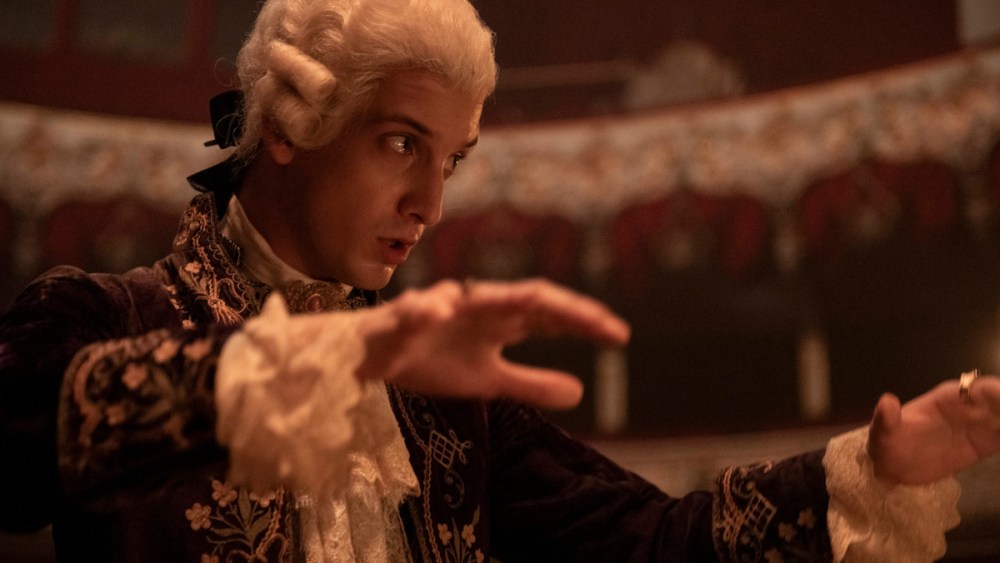Rise of a Genius’ in Key Territories
“Mozart: Rise of a Genius,” a three-part docu-drama commissioned by BBC and produced by 72 Films, has sold to the Middle East (BBC), Denmark (DR), Sweden (SVT), Slovenia, Croatia, Serbia, Kosovo, Bosnia & Herzegovina, Macedonia, Montenegro and Albania (Discovery) and Hong Kong & Macao (Now TV).
Fremantle is handling global distribution and will meet with interested buyers at Mipcom starting Monday, Oct. 21.
The show, which first premiered on Sept. 16 on BBC Two and BBC iPlayer, is taking a closer look at the iconic composer. But producer Joe Fell assured that any comparisons to Miloš Forman’s “Amadeus” are unwarranted.
“[‘Amadeus’] was a very good starting platform because classical music is not something people know that much about these days,” Fell tells Variety. “They don’t know the story behind these people’s lives. One exception to this rule is Mozart – precisely because ‘Amadeus’ was so famous.”
Despite the accolades that film received, much of the film was “not based on documentary evidence at all.”
“Especially the story about him being murdered by [another composer] Salieri, which is simply not true. It gave us something to react against in a really fun way.”
Fell adds: “One of the quotes from one of our contributors that stayed with me was that Mozart wasn’t the child prodigy that never grew up. He was a man who had to grow up way too quickly.”
The show – which follows “Shakespeare: Rise of a Genius” – will surprise many viewers, he assured, calling Mozart a thoroughly “modern character.”
“In a sense, he was more of our time than of his time. He was brash, arrogant and very individualistic. He was positioning himself as a ‘rock star’ composer and he’s the original child star. You can trace that lineage all the way to Judy Garland, Britney Spears and Macaulay Culkin. This examination of a psyche that’s wounded from a young age, which is so zeitgeisty right now, was something we wanted to explore.”
Producers say they will also examine the composer’s “formative” relationships with women: his mother, sister, first love and his wife.
“I don’t think it’s necessarily something people consider when they think about him,” adds Fell.
“The way he writes about them is so revealing of the man he was: there is this depth of emotion and love. You get a sense of a very emotionally intelligent man. He was flawed, too, arrogant, and he relentlessly tried to prove himself. But he was someone who had a lot of love to give.”
Mozart spent his whole life “reacting against” his domineering father.
“Leopold was a very complex, contradictory figure. In many ways, he was a nasty man, and sometimes, you can’t believe he would say these things to his own son. One of the essential questions we wanted to ask in the series is this: what happens when the world’s most famous child prodigy grows up? What happens to this mind, and what chaos ensues?”
Mozart’s letters proved invaluable to the team.
“The gift of Mozart’s story is that so much documentary evidence has survived, unlike with Shakespeare. We have hundreds of letters between him and his father, for example, and through them we can understand him in such an intimate way. What we wanted to do, at all times, was find ways to bridge the gap between work and life. And because of these letters, we basically have the script of his life for actors to read from.”
Stephen Fry, Richard E. Grant, “Bridgerton’s” Adjoa Andoh, Sheila Hancock, Karla Crome and Chris Addison feature in the show.
“Chris and Stephen did a double act, reading one of the poems Mozart wrote in this really debauched period in his life. It’s mad, and I won’t quote it here because it’s full of profanities,” Fell jokes.
“It’s little moments like that that add a bit of charm. This is a man who was absolutely blessed with the biggest amount of charisma, but sometimes it’s hard to see this personality coming through.”
“Mozart” combines interviews, reconstruction and live orchestral performance as well as known composers and musicians also discussing his work. Among them, Edward Gardner, principal conductor of the London Philharmonic Orchestra, performer Lucy Crowe and pianist Robert Greenberg, among others.
“You want people who perform and love his music. Golda Schultz, South African soprano, was one of the standouts for me. She’s just released an entire album about Mozart [‘Mozart, You Drive Me Crazy!’]. We aim to bring him to the modern audience, so we needed to bring these people with us.”
“There’s ambition to do more” in the future, Fell admits, elaborating that he would like to focus on Beethoven next. “And Dickens, speaking of British national heroes.”
“As a format, it’s a winner. The style of telling these stories is very cinematic and character-driven. For the general audience this could be really informative, but the story’s always the king.”


